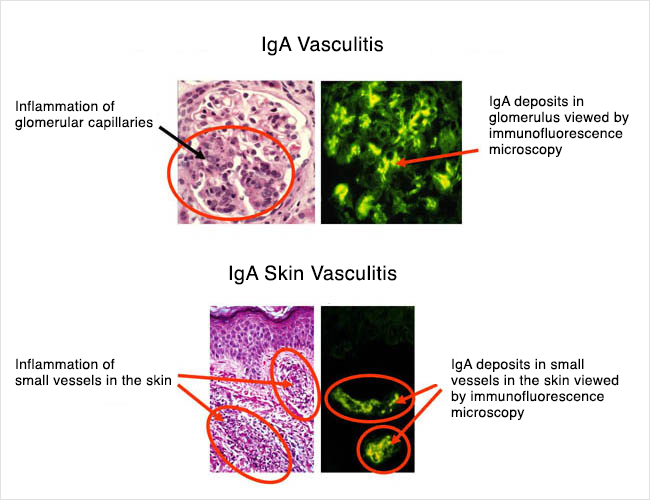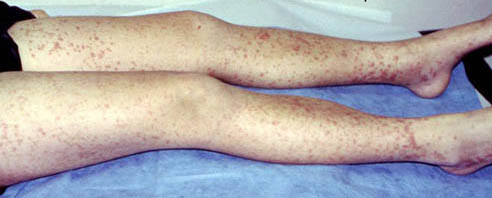IgA Vasculitis (Formerly Henoch-Schönlein Purpura or HSP)
What is IgA vasculitis?
IgA vasculitis (formerly known as Henoch Schönlein purpura) is a form of blood vessel swelling, also known as vasculitis. It affects the small vessels called capillaries in the skin and the kidneys. The swelling is due to an abnormal response of the immune system. This is due to the immune system product called IgA immunoglobulin.
What does it look like (under the microscope)?
Skin samples under a microscope show proteins IgA and C3 deposited in the blood vessel walls.
In the kidney, IgA vasculitis (Henoch Schönlein purpura) is characterized by IgA deposits in a part of the glomerulus where blood is filtered. These deposits can be seen under a microscope. The pathologist uses a special staining called immunofluorescence. The deposits will give a fluorescent glow under the microscope.

The pathologist can also use Light microscopy which magnifies the kidney by 10 to 100 times its original size. This can show a wide range of changes in the kidney filter. These may range from increased cells in the filtering area, increase in white blood cells, and abnormal cell growth in some parts of the filter. Sometimes the pathologist will see the development of cell growths called crescents, named for their moon-like shape.
How did I get it?
IgA vasculitis has no known cause. It occurs most often in the spring. It frequently follows an infection of the throat or the respiratory tract. It seems to represent an unusual reaction of the body’s immune system. This is in response to this bacterial or viral infection. Aside from infection, certain medications can also trigger the condition. IgA vasculitis occurs most commonly in children. People of all age groups can be affected.
What does it affect?
It affects the skin, joints, bowels and the kidneys. Infrequently, problems in other areas of the body, such as the nerves, brain and lungs may occur.
This table shows how symptoms might appear in the specific affected body parts.
| Affected Body Part | Symptoms |
|---|---|
| Kidney | Red or tea colored urine, weight gain, swelling on legs |
| Joints | Joint pain and swelling of ankles knees and elbows |
| Skin | Rash in buttocks and legs, appearing as red or purple spots |
| Gastrointestinal Tract | Abdominal pain, nausea, vomiting, constipation or diarrhea, bowel obstruction, blood in the stools |
| Lungs | Cough, coughing up blood |
The table below describes the type of specialist you might see depending on your symptoms.
| Affected Body Part | Doctor |
|---|---|
| Kidney | Nephrologist |
| Joints | Rheumatologist |
| Skin | Dermatologist |
| Gastrointestinal Tract | Gastroenterologist/Surgeon |
| Nerves/Brain | Neurologist |
| Lungs | Pulmonologist |
What are the symptoms?
IgA vasculitis usually causes a skin rash most prominent over the buttocks and behind the lower legs.

It could also result in joint pain and swelling (arthritis). There is sometimes fever and cramping pain in the abdomen. The joints that are usually affected are the ankles and the knees. Swelling of the blood vessels in the kidneys can cause blood and/or protein leakage into the urine. Serious kidney complications are uncommon but can lead to advanced kidney disease. Symptoms usually last about a month.
How is it diagnosed?
No single laboratory test can confirm IgA vasculitis. Certain tests can help detect the illness. Urine and blood tests for swelling and kidney function can detect the presence of IgA vasculitis. Samples of the skin or kidneys can be used to diagnose vasculitis. Special stainings can be used to find the abnormal immune system product (IgA) in the blood vessels of the areas involved.
What is the treatment?
There is no specific treatment for IgA vasculitis. IgA vasculitis is generally a mild illness that resolves spontaneously. However, when it is severe it can cause serious problems in the kidneys and bowels.
The treatment of IgA vasculitis will depend on what is most significantly affected. Joint pain can be relieved by anti-inflammatory medications such as aspirin or ibuprofen (Motrin). Some patients require corticosteroid medications, such as prednisone or prednisolone. This is especially true for those with significant abdominal pain or kidney disease. With more severe kidney disease, there is involvement called glomerulonephritis or nephritis. Cyclophosphamide (Cytoxan), azathioprine (Imuran), or mycophenolate mofetil (Cellcept) have been used to suppress the immune system. Infection, if present, can require antibiotics.
What are my chances of getting better?
The outlook for IgA vasculitis is generally excellent. Nearly all patients have no long-term problems. The kidney is the most serious organ involved. Some patients might have serious long-term kidney damage. Rarely, patients will experience a bowel obstruction. Surgery may be necessary to correct this.
The chance of the disease coming back is low but can occur. It is usually in the form of skin rash, that comes back a few months to a year after symptoms of IgA vasculitis begin.
IgA vasculitis in adults is generally more severe than in children. Adults have more severe kidney involvement. They may need more aggressive treatment.